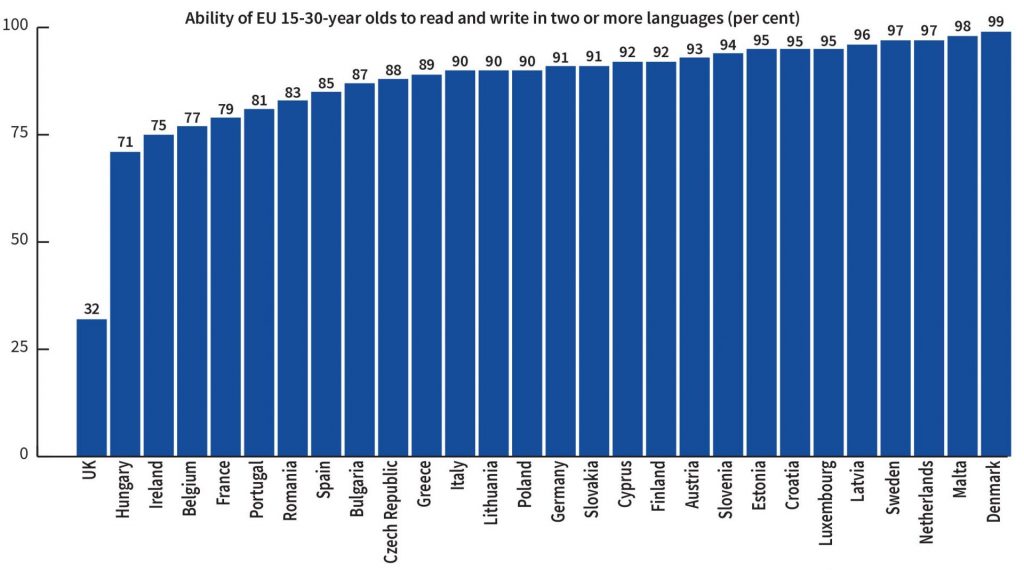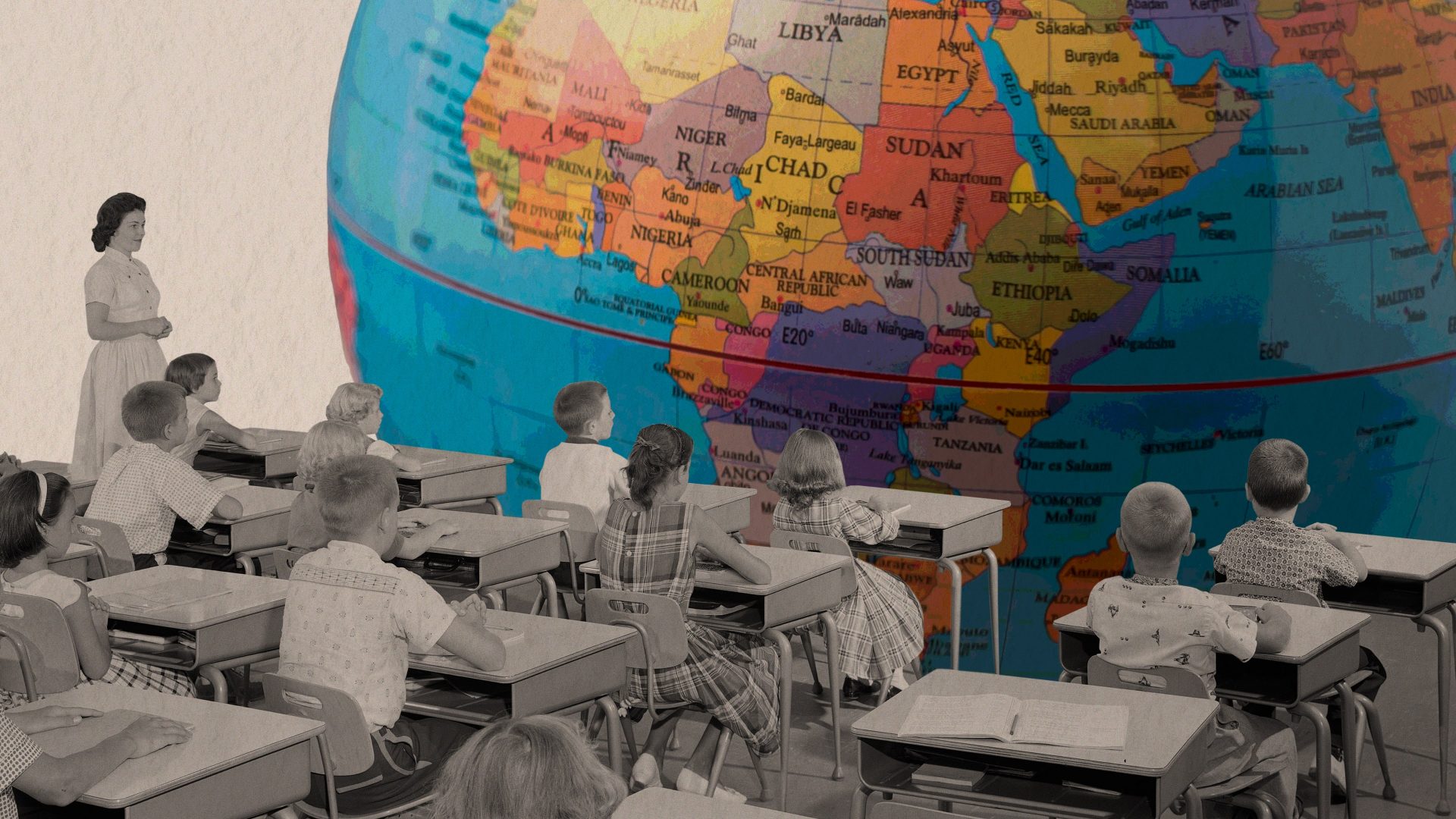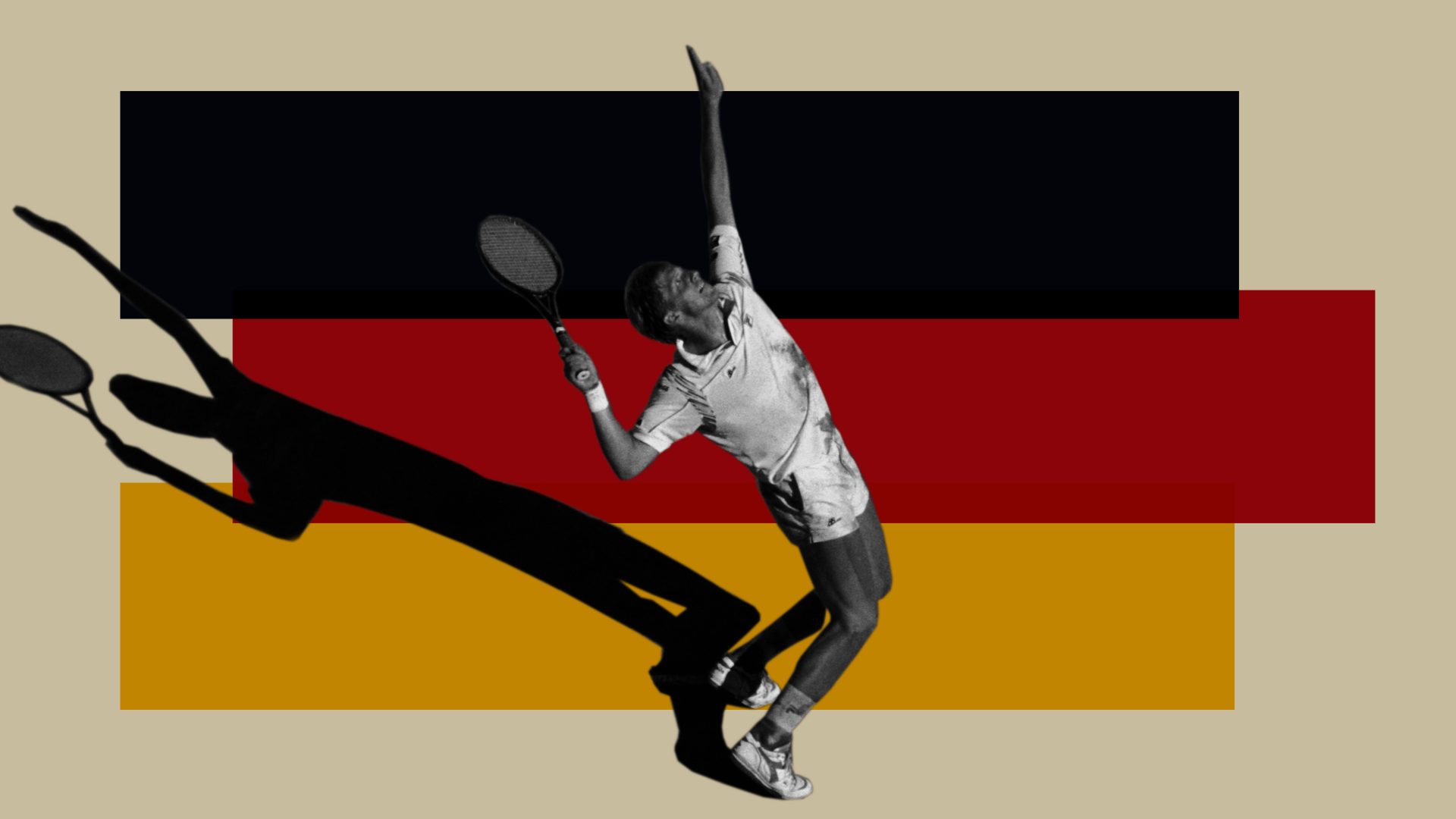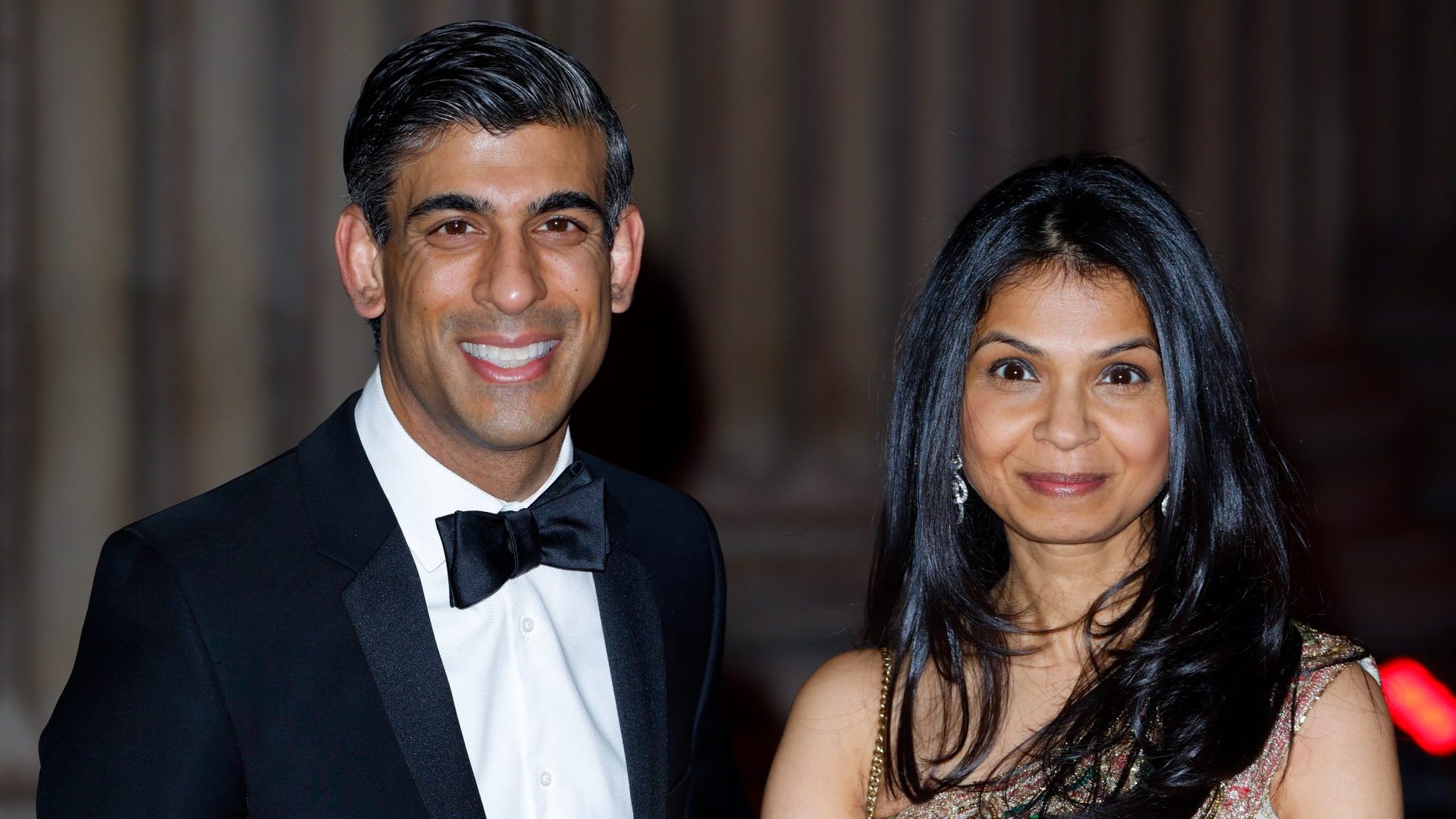As Vladimir Putin doubles down on violence in Ukraine, it is no surprise that many despair at the state of global leadership, our collective inability to restrain authoritarianism and polarisation, and our failure to promote a narrative on how to live together in the face of geopolitical trends that seem set to divide and polarise us. The sense that we are becoming more global is in retreat, battered in Syria, Afghanistan and now Ukraine, and orphaned by Donald Trump’s America. In a world in flux, we yearn to take back control.
Yet, away from the headlines, a quiet revolution is taking place in the hope that we can teach – and crucially, assess – what it means to be global. Its champion is a thoughtful, serious, 6ft 4in German data scientist called Andreas Schleicher. His day job is director of global education at the Organisation for Economic Cooperation and Development, the closest thing we have to the world’s headteacher and a modest but vital rebel against entrenched thinking.
“If we’re scared that human jobs will be automated, why are we still teaching kids to think like machines? Artificial intelligence should push us to think harder about what makes us human. If not, the world will be educating secondclass robots and not first-class humans.” He worries that we are not teaching young people what they now need to thrive. “Students who grow up with great smartphones but poor education are at unprecedented risk. In the past, teaching content knowledge was the ultimate goal of education, but we are no longer rewarded for what we know.”
Schleicher knows what he is talking about. Every three years, he and his team compile the results of the Pisa test, taken by more than half a million children in more than 80 countries to assess the quality of education. Governments hang on the results, terrified that they will plunge down the rankings. Many commentators have rightly questioned the focus on academic tests – in 2014, 100 academics said that Pisa was “impoverishing our classrooms”.
But it turns out that Schleicher himself is the biggest critic. “We have to change what we test if we are to change the way we educate young people,” he told me. He has been in a years-long arm wrestle with education bureaucrats to focus much more on teaching global competence. Basically, to develop the cultural antennae to thrive in such an interconnected world. “You do not understand your own language until you learn another language. You do not understand your own identity until you understand other identities.” Many governments, including the US and UK, opted out of the process, reluctant to jettison the factory model. “Our industrial education system is a relic of the 19th century,” he told me. “It may be the young people themselves who have to change it.”
Schleicher is getting support from unexpected quarters. Chinese tech giant Jack Ma started life as a teacher. “I learned everything in life from that,” he told me at an education conference in Paris. “I failed my exams many times. At Alibaba I was a ‘chief education officer’ more than a ‘chief executive officer’. As well as rewarding teachers more, he says we need a huge overhaul of exams. “Why is it that I have to retrain university graduates when they join my company? A university degree is just a receipt for the money you spend on the tuition.”
I asked him what he thinks young people need to learn instead of the rote learning and memorisation that dominates current education. He was unequivocal. “To confront failure, so that they can learn from risk. To be more creative, so that they can work in teams. To learn empathy, so that they can understand those around them. In the 20th century, you won by caring about yourself. In the 21st century by caring about others.” Like Schleicher, he believes that the missing ingredient is young people learning how to interact with the world beyond their borders. “The world of tomorrow requires people who can get out of their comfort zones. Kids need to start practising that.”
So are Andreas Schleicher and Jack Ma right? And if so, how can we help our children to develop the vital survival skill of global competence? And how can we too be more globally agile?
There are three growing reasons why this matters. First, automation means that our children will have to develop a very different skillset to us. As industries rise and fall faster, people will need to move to where the opportunities are, not stay where they were.
Second big reason: employability. Like Ma, business leaders consistently tell me that education is not providing young people with the social and emotional skills they need to solve problems, work with new information, or fit in well with a team. They say that the skills they look for now are those where humans have an advantage over machines: adaptability, creativity and teamwork. Employers want people who can adapt to new environments.
Most important is the third reason: humanity faces an age of climate crisis, more mass epidemics, huge migration, new forms of warfare and the rise of rival intelligences. All of these massive challenges are global in nature. The world needs people who are able to work comfortably across national and social boundaries. So how do you test for global competence? The OECD has developed assessments that check how students synthesise knowledge and make connections between ideas.
So, for example, you would be rewarded for spotting the link between the climate work you have done in biology or chemistry, the political work you have covered in history and the documentary you saw on the next climate summit. Global competence tests are more likely to reward collaboration and teamwork than solo learning. Students would be encouraged to show how they can identify and understand perspectives other than their own.
My parents had a poster on the wall saying “never let school interfere with your education”. Technology now provides you with the tools to learn not just from the teacher next door but from the best possible teachers anywhere in the world. But if you don’t have that level of openness and willingness to engage with diversity, you won’t cope. And classrooms risk becoming a lab, market or ego trip for big tech.
As chief executive of the British Library, Roly Keating is the closest thing we have in the UK to a national curator of knowledge. He also sees this risk. “We live in an age of politicisation or simplification of the historical record, or myth-making of various kinds, whether it’s about national identity or religious identity or politics or individuals. So our message to young people, to all of us, has to be that when you think you’ve got the answer, ask again. The best critique of the book you just read is the book you’re about to read.”
The new dividing lines will be between those who can embrace this readiness to question themselves, to embrace new ideas and cultures, and those who feel left behind by it. Those dividing lines will no longer necessarily be about wealth, or nationality, but whether we are open or closed to the world.
So what skills should we focus on if we are not to end up on the wrong side of that dividing line, to be sufficiently global? The Brookings Institution think tank took more than 300 lists of key skills and boiled them down to six: critical thinking and problem-solving; collaboration and influence, especially with one’s peers and within diverse groups working across national borders; mental agility to adjust for changes and unknowns and to upskill quickly and as needed for career needs; entrepreneurship to identify and act on new ideas; effective communication; the ability to access and analyse information; and curiosity. Rebecca Winthrop, who led the project, told me that “with hindsight, it would have been better to keep the learning goals even simpler – life, work and citizenship”.
If you are lucky, your children will be at a school that is already experimenting with teaching in this way. Harvard education gurus Fernando Reimers and Connie Chung have even developed a curriculum for global citizenship. Reimers told me that we are a long way from countries adopting such a change, “but I don’t doubt for a second that you can build coalitions with various individuals and groups and networks, interested in global citizenship, and that they will do it”.
I asked Chung if there was a danger that the effort increased inequality, because it gave another advantage to those who could afford to send their children to schools in the vanguard. She agreed that we were at a moment of peril. “The danger is that those who can’t access these global skills will fall further and further behind. That myth of ‘if you study hard you’re going to do well’ is not going to be true for a lot of kids. The nightmare in the back of my mind is that we may be too late.”
The challenge for the next phase is to find ways to measure these skills, so that governments, educators, learners and parents are more incentivised to take them seriously. I’ve worked with experts at Cambridge University and Unicef on a global learning passport that could allow young people – especially migrants and refugees – to carry qualifications between national systems. The current system places those who move between countries at a significant disadvantage. Yet it is often those who have experienced more disrupted lives who are best able to demonstrate these skills. Refugees don’t need an after-school club on resilience. They have a highly developed radar for opportunities and risks.
The most globally agile students are excited about discovering more about the world. This is not – as my generation might sneer – about Instagramming suitably exotic experiences or any other selfinterested motivation to posture as worldly, but about meeting, interacting and learning from different people and cultures. Without it, genuine global agility is impossible.
We also found that people who have made transitions between cultures can think more critically about the information around them, and not take it at face value. Fake news and the internet have shown many academically smart people that we must learn how not to be dumb, or how not to be reflexive. Globally agile humans are able to sift and combine information from different sources: books, friends, mentors, traditional and digital media. This allows them to develop greater perspective. They are more likely to see different sides to an argument. They are less likely to fall into the trap of reaching emphatic opinions without going through the substance of the argument.
Global agility also requires digital savvy. Not an ability to code. But more a sense of how to use different platforms effectively and responsibly, and to navigate between them. Young people who struggled to adapt were often those more likely to be propelled by social media towards getting stuck in a gang or echo chamber. Again we found that refugee communities, often those who had not grown up with constant access to social media, were better able to use the access to the internet they had to establish more meaningful connections, for example with distant family, and as the key to accessing essential information. The most adaptable humans of the future will be those who have the flexibility of thinking and doing to be ready for unexpected changes.
Our worldviews are shaped by where we come from, and we have multiple, overlapping identities: a child can be a girl, European, tennis player, Muslim and Justin Bieber fan. The key is that she can understand how these different tribes shape her life, and therefore apply the same thinking when she meets people from other tribes. Our individual cultural affiliations are unique, fluid and dynamic. Our values are not uniquely special.
That does not mean that we all become, in Theresa May’s regrettable phrase, citizens of nowhere. The more globally agile individuals we interviewed recognised that their cultural identity was neither fixed nor superior; they saw their self as something they could continue to inform, value and nurture. They could connect the global and the local. We need to know what baggage we carry, and why. The answer to the 21st century is not to let the friction of globalisation grind away our differences or let us lose a sense of where we are from. We often need to make the connection between local and global, for example understanding the risks of climate change by studying floods in our own neighbourhood. We will be better able to tackle those global challenges when we retain an ability to root them in experiences that people understand.

The more globally agile young people we interviewed also had stronger communication skills: they were more likely to be able to interact respectfully and flexibly with other cultures. Future assessments of young people will need to evaluate whether people can read others’ approaches to communication and adapt, building bridges to new people and cultures, especially those that initially appear most different. It is about listening as much as talking.
The most effective global operators in our study had exceptional antennae. Can you zoom out and see a person or situation in 360 degrees? This means being able to listen humbly and observe, including body language.
At its best it also requires a good dose of empathy: can you get in the other person’s shoes, and understand their motivations? The most globally agile people care about the world around them, and think that they can make it better. They can see that people from other places share the same basic rights to food, shelter, work, education, happiness, dignity.
As the international adviser on education the late Sir Ken Robinson argued, education should equip people to live together in tolerant and culturally diverse societies, “to understand the world around them and the talents within them so that they can become fulfilled individuals and active, compassionate citizens, able to build lives that have meaning and purpose in an unpredictable future”.
“He told me that the question he was asked most was “where can we go for ideas on how to get that understanding?” We need future humans to be citizens of everywhere. As good ancestors, we can make the world fairer and safer for our descendants. This requires an overhaul of why, how and what we learn.
But it is worth it: education is upstream diplomacy. At a moment when we badly need it, that is a cause for hope.
Tom Fletcher is the principal of Hertford College, Oxford University. He is a former UK ambassador, visiting professor at New York University and No 10 foreign policy adviser. His latest book, Ten Survival Skills for a World in Flux, was published last month by Harper Collins.



